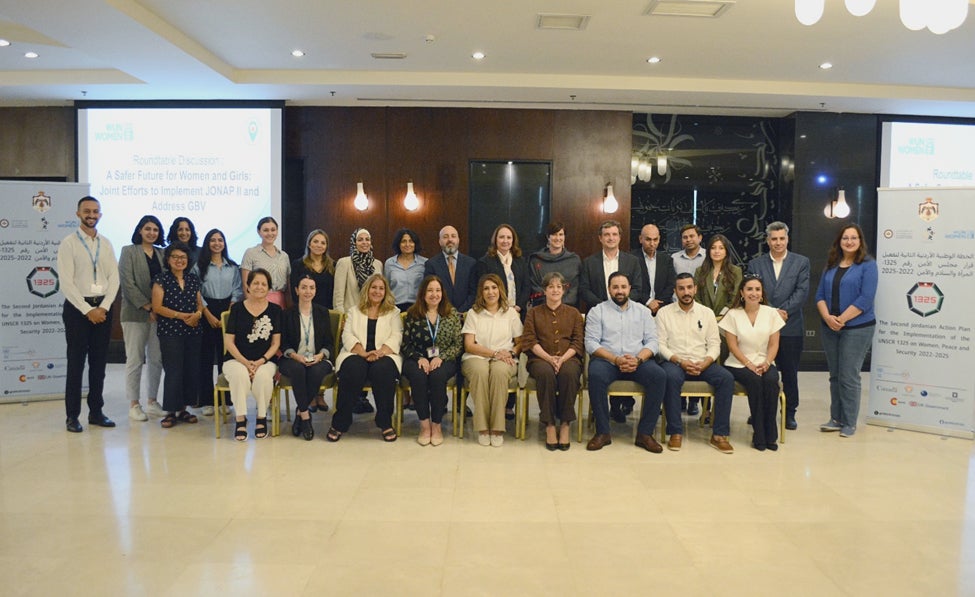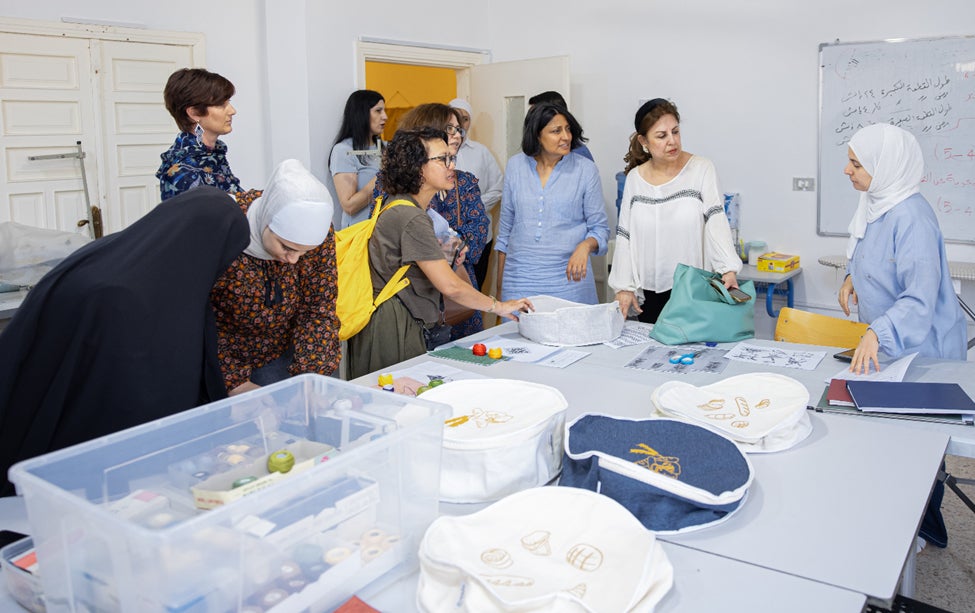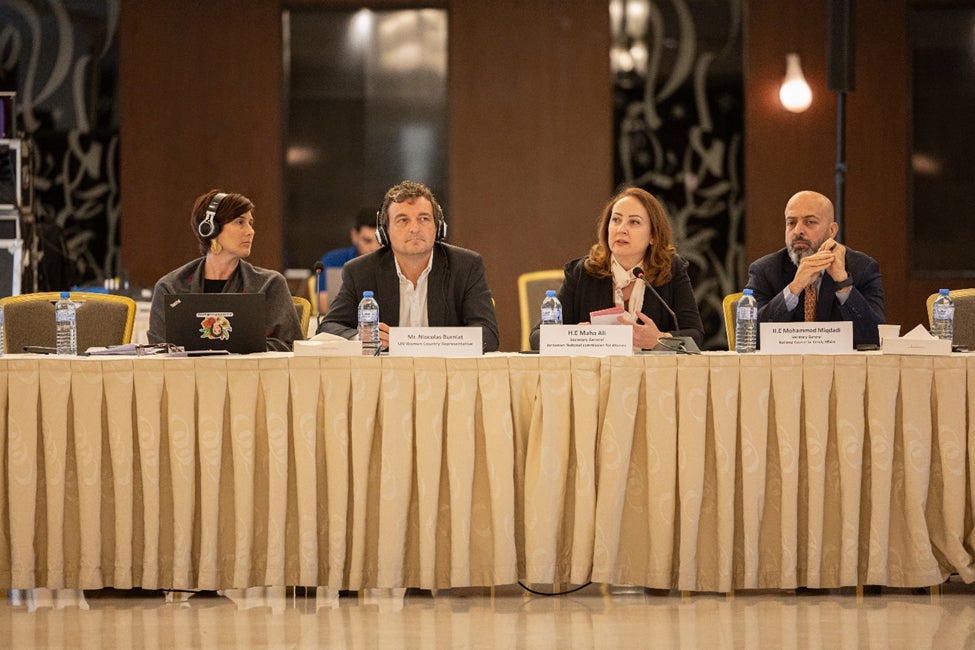Rights and Might: Women’s Rights Organizations Lead Efforts to Reduce Violence Against Women in Jordan
Date:

When Samah arrived at the Collateral Repair Project (CRP) in Jordan, having fled war-torn Darfur in Sudan, she was hoping to find a new life and safety for her two children. “CRP provides quality education,” she said, “and is essential for leaving [my] children in a safe environment as a community centre for us”, adding that this enabled her to gain skills in crochet, embroidery and henna to make ends meet. CPR is one of the current grantee partners of the UN Trust Fund to End Violence against Women (UN Trust Fund) that provides crucial support to refugee women and girls who face increased risks of violence.
Supporting refugee women and girls in Jordan

According to UNHCR[1] and UNWRA,[2] Jordan hosts over 3 million refugees, the second highest number per capita in the world. Over 2.3 million originate from Palestine, over 600,000 from Syria, and more than 110,000 from Iraq, Yemen and Sudan. The country is also a key regional hub for humanitarian assistance to Palestinians in conflict-ravaged Gaza.
Recognizing the efforts made by Jordan as a host-country and the importance of women’s rights organizations in providing localized responses, the UN Trust Fund is investing over USD 4.1 million in initiatives in Jordan – its largest investment in a single country – to help counter increased risks of violence against women and girls.
Initiatives led by five grantee partners have reached over 35,000 people, with 1,650 cases of sexual and gender-based violence referred to state services in the past year alone. One of the partners, the Arab Women’s Organization (AWO), runs two women’s centres where survivors of violence, both refugee and Jordanian women, can access support services, including case management, legal advice, referrals and skills training.
The UN Trust Fund’s investment complements the ongoing efforts of UN Women Jordan Country Office to provide life-saving and critical social and economic empowerment activities to affected populations. Under its Oasis programme, UN Women Jordan has established 22 centres across the country in the past decade to provide Syrian refugees and vulnerable Jordanian women in host communities with livelihood support, leadership training and gender-based violence awareness raising and referral services.[3]
The support UN Women gives to the Jordanian National Action Plan (JONAP) on women, peace and security includes helping Jordan’s government to strengthen the quality of services for survivors of violence and directly supporting increased availability and accessibility of services through civil society organizations. Under JONAP, over 45,000 women and girls benefited from increased access to services, with over 3,000 survivors receiving psychological support and legal assistance in recent years through civil society.
Delegation witnesses the power of collaboration
The importance of these collaborative efforts was highlighted in July 2024 during a week-long visit to Jordan facilitated by UN Women Jordan. Delegates included Abigail Erikson, Chief of the UN Trust Fund; and Ritika Dhall, Deputy Director of the Department for Human Development Section for Gender Equality at the Norwegian Agency for Development Cooperation (Norad), a long-standing UN Trust Fund partner.
The delegation visited UN Trust Fund grantee partners* and witnessed the crucial support they offer women survivors and those at risk of violence, including Syrian and Palestinian refugees. They also observed how these civil society-led initiatives help implement national policies on peace and security.
Delegates attended the launch of a new UN Trust Fund-supported initiative led by the National Association for Family Empowerment (NAFE), which is building on the success of its previous collaboration with UN Women under the Women, Peace and Humanitarian Fund (WPHF). Using pioneering creative approaches such as interactive theatre, drawings and puppet shows, NAFE spreads transformative messages about issues that include women’s rights, gender-based violence and the importance of women’s participation in peacebuilding and the economic recovery process in Zarqa and Ma’an governorates.
NAFE is also receiving support to build its technical capacity in areas such as communications, advocacy and financial management.[4] This has helped the women-led organization secure a UN Trust Fund grant to improve access to gender-sensitive prevention and protection services for at-risk communities in Jordan.
Rania Al-Hayyouk, Executive Director of NAFE, said:
“The WPHF [Women’s Peace and Humanitarian Fund] and UN Women support helped build the capacity of the organization and our team, and helped us focus on building our priorities, which encouraged us to apply to larger funding opportunities such as the UN Trust Fund.”
Roundtable

UN Women also convened a roundtable in Amman with the Jordanian National Commission for Women, the National Council for Family Affairs (NCFA) and the UN Trust Fund entitled: "A Safer Future for Women and Girls". This brought together diplomatic missions, the development community and civil society to discuss the role of civil society organizations in supporting national efforts to combat gender-based violence, including under JONAP. Sessions addressed the role of these initiatives in promoting peace and humanitarian efforts, and the critical role of the NCFA in protection and prevention.
Ritika Dhall, said:
"We see the vital importance of collaboration across government, civil society, and multilateral organizations in addressing gender-based violence. Norway is proud to partner with UN Women and the UN Trust Fund to support national investments and especially women’s rights organizations. Through more and better coordination and efforts, we can make substantial strides in reducing violence against women and girls and safeguarding their rights."
Nicolas Burniat, UN Women Jordan Country Representative, remarked:
"In a context where national and international financial resources for work on gender equality are limited, it is essential to ensure that we all work together, hand in hand and in a coordinated manner – government, civil society and international partners. This has been the spirit under which JONAP has been implemented and we are delighted to be working closely with the UN Trust Fund… to ensure that we maintain this approach as we scale up support for national efforts to prevent and respond to gender-based violence."
Empowering partners
The collaboration between UN Women and the UN Trust Fund is empowering women-led organizations to effectively lead initiatives that not only improve access to specialist gender-based violence services but also contribute to national efforts to provide sustainable support to women and girls most at risk of violence.
Abigail Erikson notes:
“Three decades since the UN Trust Fund was established, we still wholeheartedly believe that women’s rights and civil society organizations play a crucial role in delivering bold, innovative and life-changing initiatives to prevent and end violence against women and girls. It is key that they are part of the discussions and solutions with key government partners in effective implementation of the National Action Plan to safeguard women’s rights in Jordan and beyond.”
* AWO, CPR, Jordanian Women’s Union (JWU) and NAFE. AWO and NAFE were grantee partners of the WPHF; JWU and NAFE were partners of UN Women Jordan.
____________________________________
[1] https://data.unhcr.org/en/country/jor
[2] https://www.unrwa.org/where-we-work/jordan
[3] https://www.unwomen.org/en/news-stories/feature-story/2023/12/un-womens-oasis-programme-empowers-jordanian-and-syrian-women
[4] Women’s Peace and Humanitarian Fund, Annual Progress Report 2020, https://mptf.undp.org/sites/default/files/documents/35000/jordan_wphf_regular_covid_erw_annual_report_final_approved_2021.03.26.pdf